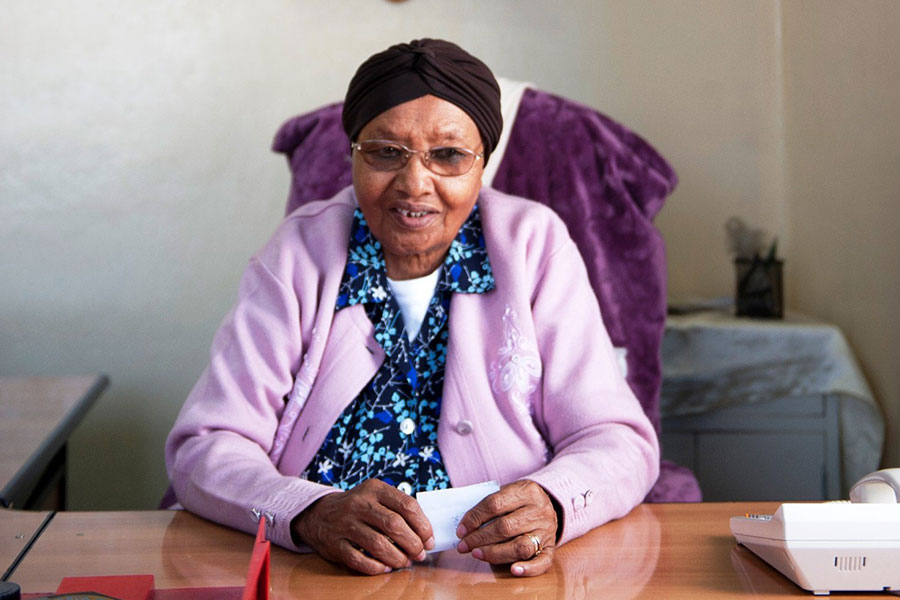
Obituary | Jul 11,2021
Dec 7 , 2024
By Carolyn Kissane
It has been several months since my mother-in-law passed away, and we have yet to share the news with our three- and four-year-old children. Recently, they have been inquiring about her asking when she will visit and why she has not come to see them. Before her passing, she had been away for six months, visiting only twice, which somewhat eased them into her absence. Yet, my son has expressed a desire for her to pick him up from school, and my daughter has mentioned missing her. Even their eight-year-old cousin has asked why she has not visited, prompting us to respond that she is busy and far away, but she sends her love and hugs.
Just the other day, while picking up my son from school, he noticed a funeral tent in a nearby yard. He asked what the tent was used for, and I explained that such tents are often used for funerals. He seemed puzzled and asked if the deceased person was inside. I clarified what funeral entails and how people gather to pay their respects to someone who has passed away. Despite my explanation, he struggled to grasp the concept of death. This left me wondering how to eventually tell him about the passing of his grandmother. For now, I have been saying she will return, but I realize I can not continue this indefinitely.
This situation has prompted me to seek guidance on how to approach such delicate topics with young children. I have found valuable advice online about communicating difficult news to kids in an age-appropriate and sensitive manner. While it is a challenging task, I now understand the importance of honesty paired with sensitivity to their developmental stage and emotional capacity.
A child’s age, understanding of death, and relationship with the deceased shape how they process such news. Young children, particularly preschoolers, often perceive death as temporary, imagining the deceased is simply asleep or on an adventure. Older children may understand the permanence of death but still struggle emotionally, requiring a different approach.
For very young children, simplicity and honesty are key. Avoid euphemisms such as “passed away” and “gone to sleep” as these can confuse them and lead to false expectations. Instead, use clear and concrete language, such as, “Grandma’s body stopped working, and she is not coming back.” Reassure them that the death is not their fault and that they are loved and safe.
Parents can also use tangible connections to help children process grief. For example, instead of saying, “Grandma is in a better place,” focus on memories. We will not see Grandma anymore, but we can remember her by looking at her pictures or talking about the fun times we shared.” Visuals like photographs or cherished objects can provide comfort and help children process their feelings.
For older children, a more nuanced approach is needed. While they may understand death's permanence, their emotional reactions can still be profound. Honesty is crucial, and their questions should be answered directly and thoughtfully. Allow them to express feelings like anger, sadness, or confusion without judgement. Encourage open discussions, making space for their emotions and validating their experiences.
The environment in which you share such difficult news is vital. Choose a serene, private place where the child feels safe and secure. Avoid crowded places or moments of high stress. A calm and supportive atmosphere helps them absorb the information better. Ensure a trusted adult is present to offer full attention and comfort during the conversation.
After sharing the news, give children sufficient time to process their emotions. They may cry, express anger, or sit quietly, and all these emotions are normal. Offer physical comfort, like hugs, and reassure them that feeling sad is okay. Encourage creative activities, such as drawing, storytelling, to help them express their feelings.
This experience has been an emotional journey for me, I have come to realize that guiding children through grief requires patience, honesty, and compassion. I hope my story and these insights can serve as guidance for other parents navigating similar challenges.
PUBLISHED ON
Dec 07,2024 [ VOL
25 , NO
1284]


Obituary | Jul 11,2021

Life Matters | Dec 02,2023

Sunday with Eden | Aug 03,2024

Viewpoints | Apr 15,2023

Films Review | Apr 30,2021

Delicate Number | May 03,2025

Sunday with Eden | Jun 29,2024

Radar | Aug 01,2020

Sunday with Eden | Dec 19,2020

Obituary | Jul 10,2020

My Opinion | 131584 Views | Aug 14,2021

My Opinion | 127940 Views | Aug 21,2021

My Opinion | 125915 Views | Sep 10,2021

My Opinion | 123539 Views | Aug 07,2021

Dec 22 , 2024 . By TIZITA SHEWAFERAW
Charged with transforming colossal state-owned enterprises into modern and competitiv...

Aug 18 , 2024 . By AKSAH ITALO
Although predictable Yonas Zerihun's job in the ride-hailing service is not immune to...

Jul 28 , 2024 . By TIZITA SHEWAFERAW
Unhabitual, perhaps too many, Samuel Gebreyohannes, 38, used to occasionally enjoy a couple of beers at breakfast. However, he recently swit...

Jul 13 , 2024 . By AKSAH ITALO
Investors who rely on tractors, trucks, and field vehicles for commuting, transporting commodities, and f...

Jun 28 , 2025
Meseret Damtie, the assertive auditor general, has never been shy about naming names...

Jun 21 , 2025
A well-worn adage says, “Budget is not destiny, but it is direction.” Examining t...

Jun 14 , 2025
Yet again, the Horn of Africa is bracing for trouble. A region already frayed by wars...

Jun 7 , 2025
Few promises shine brighter in Addis Abeba than the pledge of a roof for every family...

Jun 29 , 2025
Addis Abeba's first rains have coincided with a sweeping rise in private school tuition, prompting the city's education...

Jun 29 , 2025 . By BEZAWIT HULUAGER
Central Bank Governor Mamo Mihretu claimed a bold reconfiguration of monetary policy...

Jun 29 , 2025 . By BEZAWIT HULUAGER
The federal government is betting on a sweeping overhaul of the driver licensing regi...

Jun 29 , 2025 . By NAHOM AYELE
Gadaa Bank has listed 1.2 million shares on the Ethiopian Securities Exchange (ESX),...